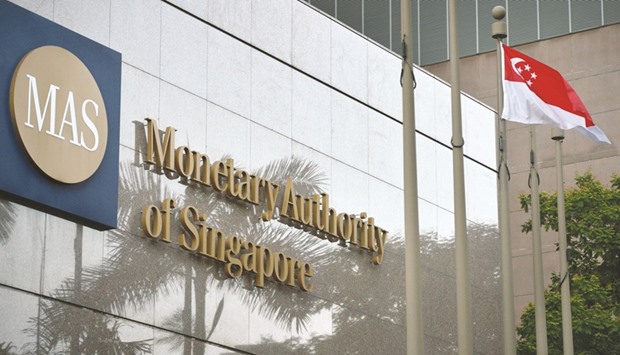Singapore’s central bank said its current monetary policy stance is appropriate and inflation may turn positive later this year, damping speculation of further easing.
“Unless there is a marked deterioration in the global economy or significant shift to the inflation outlook, there is no need to change the monetary policy stance,” Ravi Menon, managing director of the Monetary Authority of Singapore, told reporters yesterday at the release of the central bank’s annual report.
Calls had been building for the MAS to ease policy again in October to support growth in the export-dependent economy as global risks mount. The central bank, which uses the exchange rate rather than interest rates as its main tool, moved to a neutral policy in April, saying it won’t seek currency appreciation.
An unchanged stance is now the “default playbook” for the MAS in the absence of any signs of a worsening in the global economy,” Vishnu Varathan, an economist at Mizuho Bank in Singapore, said by e-mail.
“If the Brexit fallout risk continues to be contained as it has so far, and China’s nascent traction endures (and perhaps) entrenches, there will be no need for monetary policy overdrive,” he said.
The bank said headline inflation will probably turn positive this year, a departure from its guidance in June that consumer prices will continue to decline for the rest of 2016. “Inflation remains subdued,” MAS chairman Tharman Shanmugaratnam, who is also the nation’s deputy prime minister, said in the bank’s annual report. “Headline inflation has been negative for some time but could turn positive towards the later part of this year.” The consumer price index for all items – a measure of headline inflation – has declined every month since November 2014, the longest slump on record, reflecting the effect of lower oil costs and a weaker property market.
Prices fell 0.7% in June from a year earlier, the statistics office said in a separate report on Monday, compared with a median estimate for a 1.1% decline in a Bloomberg survey of 17 economists.
While the MAS has eased limits on car financing this year, restrictions imposed in 2013 to help cool the property market will remain in place for now, Menon said. Home prices have adjusted “only modestly” and while consumer debt levels have eased, “it will take time for household balance sheets to strengthen and become more resilient to interest rate and income shocks,” he said.
“The risk of a renewed surge in property prices is not trivial given that interest rates are likely to remain low and global investors continue to search for yield,” he said.
Singapore remains vulnerable to swings in global demand as the world still grapples with the UK’s decision to leave the European Union. The city state’s economy expanded an annualised 0.8% in the second quarter compared with the previous three months, according to an advanced government estimate.
The economy’s performance in the second half of the year “will not be too different” from the first six months, Menon said. He added that “you can’t rule out a particularly bad quarter.”

Singapore’s central bank said its current monetary policy stance is appropriate and inflation may turn positive later this year.
